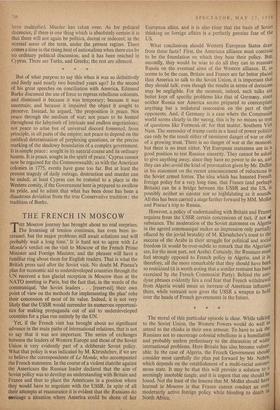THE FRENCH IN MOSCOW
HE Moscow journey has brought about no real surprises.
I The lessening of tension continues, has even been in- creased, but the major problems still await solutions and will probably wait a long time.' It is hard not to agree with Le Monde's verdict on the visit to Moscow of the French Prime Minister and Foreign Minister, and the phrases will have a familiar ring about them for English readers. That is what the British press said after the Soviet visit. No doubt M. Pineau's plan for economic aid to underdeveloped countries through the UN received a less glacial reception in Moscow than at the NATO meeting in Paris, but the fact that, in the words of the communiqué. 'the Soviet leaders . . . [reserved] their own point of view on the methods for implementing the plan' robs their concession of most of its value. Indeed, it is not very likely that the USSR would surrender its numerous opportuni- ties for making propaganda out of aid to underdeveloped countries for a plan run entirely by the UN.
Yet, if the French visit has brought about no significant advance in the main paths of international relations, that is not to say that it was not important. The series of exchanges between the leaders of Western Europe and those of the Soviet Union is very evidently part of a deliberate Soviet policy.
What that policy is was indicated by M. Khrushchev, if we are to believe the correspondents of Le Monde, who accompanied the French statesmen. In the course of a violent diatribe against the Americans the Russian leader declared that the aim of Soviet policy was to develop an understanding with Britain and France and thus to place the Americans in a position where they would have to negotiate with the USSR. In spite of all their attempts at reassurance it is evident that the Russians do envisage a situation where America could be shorn of her European allies, and it is also clear that the basis of Soviet thinking on foreign affairs is a perfectly genuine fear of the US.
What conclusions should Western European States draw from these facts? First, the American alliance must continue to be the foundation on which they base their policy. But, secondly, they would be wise to do all they can to reassure Russia on the eventual aims of the Western alliance. If, as seems to be the case, Britain and France are far better placed than America to talk to the Soviet Union, it is important that they should talk, even though the results in terms of decisions may be negligible. For the moment, indeed, such talks are better kept off specific problems like that of Germany, since neither Russia nor America seems prepared to contemplate anything but a unilateral concession on the part of their opponents. And, if Germany is a case where the Communist world seems clearly in the wrong. this is by no means so true of questions like Formosa or, for that matter, Southern Viet Nam. The surrender of trump cards in a hand of power politics can only be the result either of imminent danger of war or else of a growing trust. There is no danger of war at the moment, but there is no trust either. Yet European statesmen are in a good position to test Russian sincerity. They cannot be asked to give anything away, since they have no power to do so, and they can also avoid the kind of provocation given by Mr. Dulles in his statement on the recent announcement of reductions in the Soviet armed forces. The idea which has haunted French foreign policy for a very long time, that France (and perhaps Britain) can be a bridge between the USSR and the US, is possibly neither so sinister nor so highfaluting as it sounds. All this has been carried a stage farther forward by MM. Mollet and Pineau's trip to Russia.
However, a policy of understanding with Britain and France requires from the USSR certain concessions of tact, if not of substance. The moderation of the Soviet statement on Algeria in the agreed communiqué makes an impression only partiallY effaced by the jovial brutality of M. Khrushchey's toast to the success of the Arabs in their struggle for political and social freedom (it would be over-subtle to remark that the Algerians are, for the most part, not Arabs). Certainly, the Russians must feel strongly opposed to French policy in Algeria, and it is, therefore, all the more remarkable that they should have been so restrained (it is worth noting that a similar restraint has been exercised by the French Communist Party). Behind the alio' dyne phrases evidently lies a real fear that French withdrawal from Algeria would mean an increase of American influence there, while restraint now gives the USSR a weapon to hold over the heads of French governments in the future.
The moral of this particular episode is clear. While talking to the Soviet Union, the Western Powers would do well to attend to the chinks in their own armour. To have to ask the Russians not to encourage colonial rebellions is a humiliating and probably useless preliminary to the discussion of widet international problems. Here Britain has also become vulneP able. In the case of Algeria, the French Government should consider most carefully the plan put forward by Mr. Nehru, which depends on the establishment of a multi-racial autono, mous state. It may be that this will provide a solution to a seemingly insoluble tangle, and it is urgent that one should be found. Not the least of the lessons that M. Mollet should have learned in Moscow is that France cannot conduct an eves moderately active foreign policy while bleeding to death la North Africa.










































 Previous page
Previous page